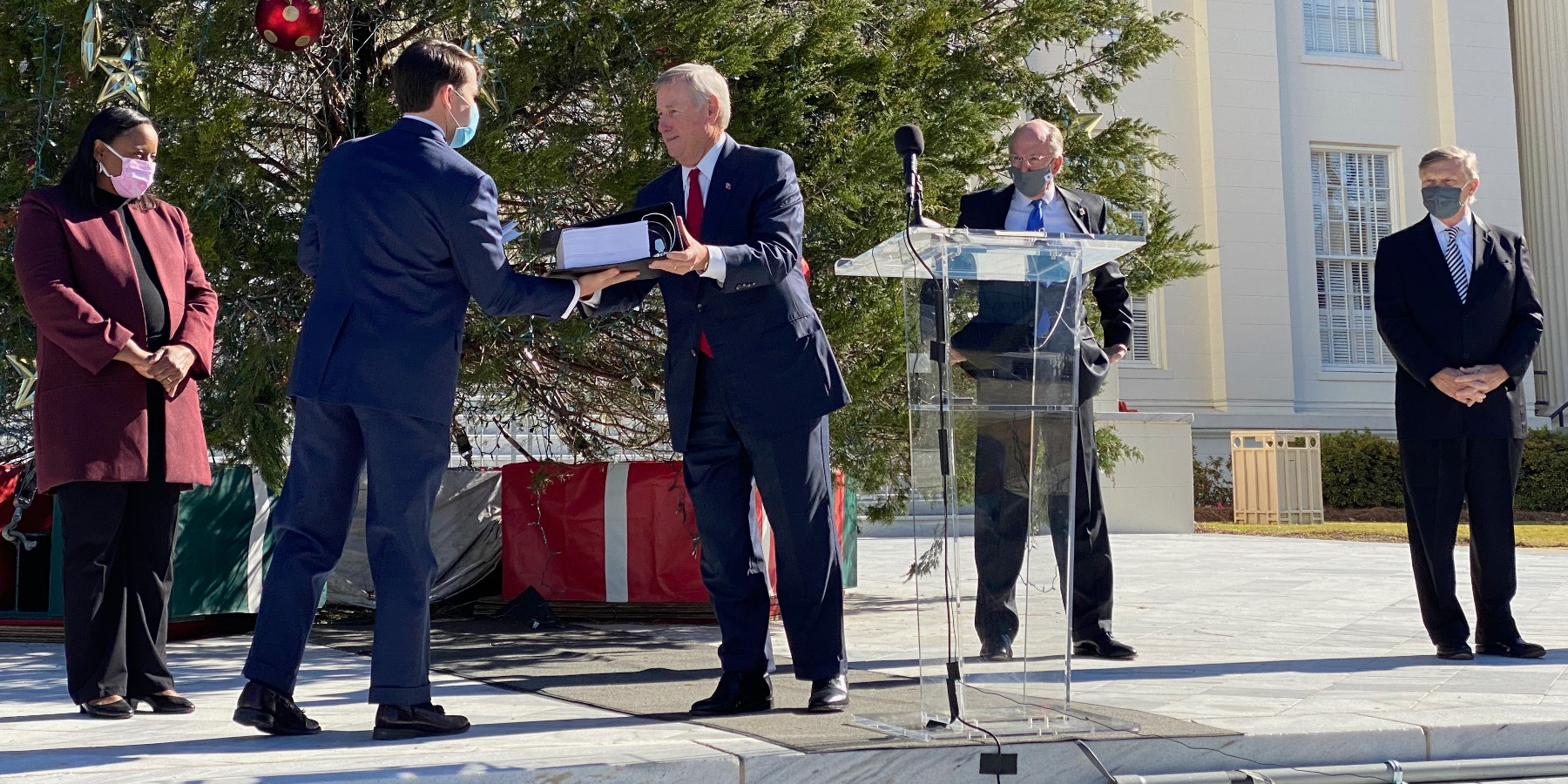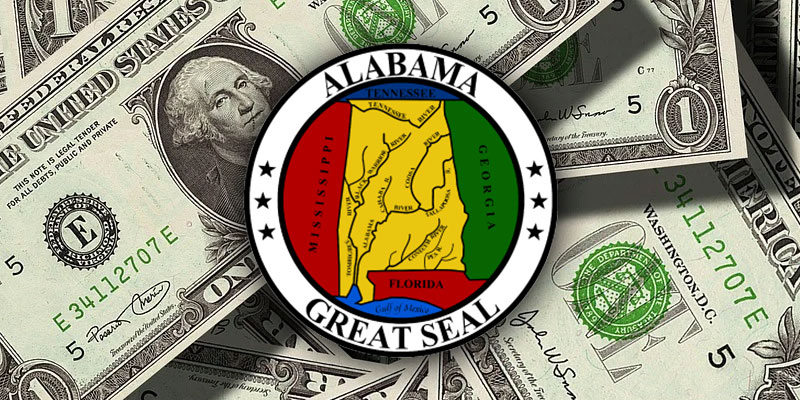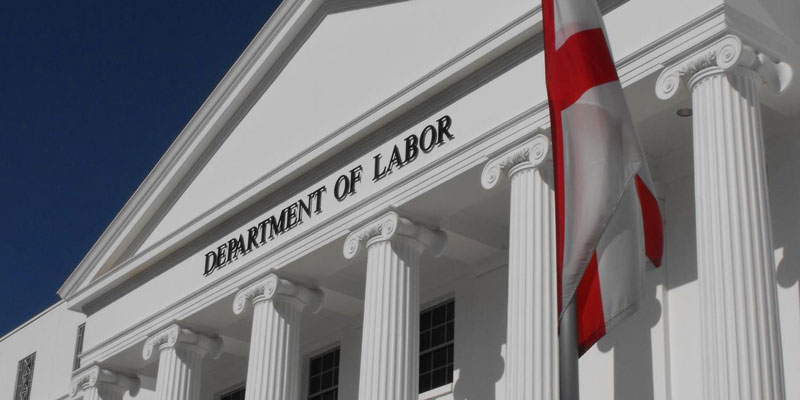MONTGOMERY — A study group on gambling in Alabama released its findings on Friday. The group estimates full gambling legalization could generate significant annual revenues for the state, and an included poll showed strong public support for legalization.
Chaired by former Montgomery Mayor Todd Strange, the Governor’s Study Group on Gambling Policy was commissioned in February and sought to present all the relevant information on the topic to state officials.
“The summary conclusions are this: one, gambling could work in the state of Alabama, and we feel the advantages outweigh the disadvantages,” Strange said on Friday during a briefing on the capitol steps.
According to the group, the potential annual revenue of legalizing gambling in Alabama could be in the range of $510 million to $710 million.
The 34 pages of findings the group produced can be read here, while a document coming in at more than 800 pages that includes a summary of each of the study group’s meetings and the documents they reviewed can be accessed here.
Governor Kay Ivey said on Friday that she and her advisors plan to “pour over the findings” and thanked the group for their hard work.
In the report’s conclusion, the group presented Alabama officials with five pathways:
(Yellowhammer News edited for length the descriptions of each option, the full language can be found in the report itself)
- Maintain Status Quo – Alabama could choose to maintain its status quo in regard to gambling. Under its current system, Alabama realizes few, if any, benefits of gambling, as there is currently no system for taxing gambling revenue, nor is the State able to designate beneficiaries of gambling proceeds.
- Prohibit Gambling & Provide Enforcement – Alabama could choose to prohibit and criminalize all forms of gambling and introduce the enforcement mechanism that it has historically not had. In doing so, the State would realize certain benefits. The State would have a defined enforcer of gambling prohibitions, which would allow it to effectively and efficiently enforce its restrictions on gambling. This would essentially end the time-consuming and costly litigation in which the State has been involved over the years.
- Prohibit All Gambling Except Lottery – Alabama could choose to approve a lottery but prohibit all other forms of gambling. Doing so would provide two distinct benefits to the State. It would generate revenue for beneficiaries, and it would
provide an enforcement mechanism for all other illegal forms of gambling. It would also introduce widespread access to gambling, which could result in an increase in social costs. - Allow Limited Gambling – Alabama could choose to approve various gambling activities while prohibiting others. Any combination of lottery, casino-style gaming, pari-mutuel wagering, and sports betting could be allowed, while restricting others. As another limited gambling consideration, the State could permit some or all forms of these gambling activities but limit the availability in terms of geographical locations
- Full Gaming – Alabama could choose to approve all the gambling activities mentioned in this report with no limitations on forms or locations. This option would provide the benefits of revenue and enforcement, but it would result in the highest social costs incurred by the State.
The group’s report is focused on three types of gambling and their potential impact on Alabama:
Lottery: “States develop and administer their own form of lottery games – including various scratch-off, draw, or instant games – that are unique to that state. Each of the 45 states that offer lottery games also allow play of multi-state lotteries, including Mega Millions and Powerball, and some states participate in smaller, regional multi- state lotteries,” the report says in part.
Casino-style Gambling: “Casino-style games are those offered by full-service casinos, including slot machines, table games, dice games, and card games. Generally, there are two types of casino operations, commercial casinos and tribal casinos,” summarizes the report.
Sports Betting: “Generally, sports betting is considered a relatively small segment of the gambling industry, but it is growing rapidly, especially with the introduction and popularity of online and mobile access to sports wagering. As previously mentioned, it is important to distinguish between traditional sports betting, which remains illegal in Alabama, and betting on fantasy sports and daily fantasy sports, which the Alabama Legislature authorized in 2019,” the report outlines.
A state lottery would generate between $200 million and $300 million annually; casino gaming could generate between $300 and $400 million annually; and sports betting could generate around $10 million annually, according to the group’s estimates.
The casino revenue estimate is based on the state having five to seven casinos.
Young Boozer, a study group member and a former Alabama state treasurer, said during the briefing on Friday that Mississippi’s estimates of lottery revenue have been accurate during the initial phases of the lottery that the state recently implemented.
Notably, the State of Alabama would directly run a lottery, while it would only license, regulate and tax casinos.
The study group commissioned a public opinion poll of 500 likely general election voters in Alabama about their views on gambling.
It found 51% support legalizing gambling outright, while another 22% personally oppose gambling but favor its legality, for a total of 73% of the public generally in favor of legalizing gambling.
The poll also asked voters’ favorability on four types of gambling;
The findings, per the report:
- 71% favored a statewide lottery, while 25% opposed a statewide lottery;
- 63% favored casino-style slot machines, while 32% opposed;
- 61% favored casino-style table games, while 35% opposed; and
- 52% favored online sports betting, while 41% opposed.
When asked if gambling would improve things, make things worse, or have no impact on the state, 54% said it would improve things, 19% said it would make things worse and 19% said it would have no impact.
The report also goes into detail on the social costs of legalizing gambling in the state. It estimates that, based on trends observed in past states by doctors and scientists, Alabama would have around 66,375 problem gamblers – people who would be classified as having a “gambling disorder” and potentially cause damage to their well being. Of that number, 13,733 would be estimated to be potential “compulsive gamblers.”
It also cites evidence that gambling can be linked to increased rates of crime, suicide, bankruptcy, divorce and lost productivity among employees at businesses.
“We have gamblers,” Strange noted on Friday, explaining that Alabama was already experiencing some of the social costs of gambling, “but none of the revenue.”
He said the study group had seen evidence Alabama has among the highest rates in the United States of illegal sports betting.
“I have been working on a comprehensive piece of legislation that would create uniformity, establish a strong regulatory framework to govern gaming and begin collecting on hundreds of millions of dollars in lost revenue that is currently going to our neighboring states,” outgoing Alabama Senate President Pro Tem Del Marsh (R-Anniston) said in a statement on Friday.
Both Ivey and Strange noted on Friday that, after any legislation passed that would increase the number of gambling options available in Alabama, the public would have to vote in favor during a general election before the change could be implemented.
“I believe it is time to address this issue, and it appears the report from the Governor’s Gaming Commission supports that position,” Marsh added.
Incoming Senate Pro Tem Greg Reed (R-Jasper) issued a statement alongside Marsh.
“Regardless of where one stands on the gaming issue, you have to recognize that Alabama has an inconsistent patchwork of laws and virtually no regulatory structure in place to deal with the gaming facilities operating here today,” Reed noted.
A frequent recurrence in the report is the problems brought on by Alabama’s current lack of a central gaming authority, and the general messiness of the state’s current gambling provisions, which Reed appears to acknowledge in his statement.
“I appreciate the Governor putting this group together to analyze this issue and will look forward to reviewing legislation that may come forward in the upcoming session,” Reed concluded.
Henry Thornton is a staff writer for Yellowhammer News. You can contact him by email: [email protected] or on Twitter @HenryThornton95.











